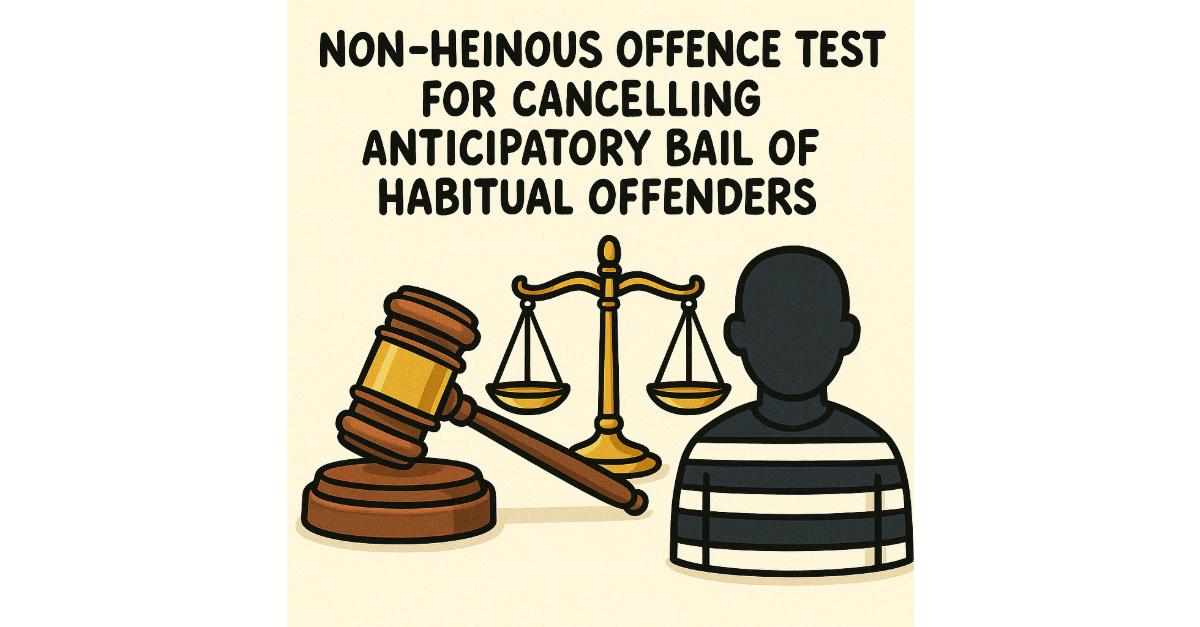CASE NAME – ANKIT MISHRA V/S THE STATE OF MP & ANR.
CASE NUMBER- SPL(Crl.) No. 14566 of 2024
DATE- 10.04.2024
QUORUM- Gwalior bench
FACTS OF THE CASE
On 30th March, the appellant went to Victoria Hospital with his friend for a medical checkup. The respondent 2 was also there for his medico-legal case. When respondent 2 saw the appellant, he got angry and abused him with bad language and also threatened him to kill the appellant and his family. He further asked the appellant to take back the complaint. After which, the appellant filed an FIR and also gave a formal statement in front of the magistrate and repeated the same allegations about the threats and abuse. The appellant that respondent 2, is a well-known gangster with 58 members operating around Jabalpur. He further added that the respondent is a habitual offender and is currently convicted in another with 2 years of imprisonment sentence.
The appellant pleads that granting him anticipatory bail would favour him and encourage him to commit more such crimes, as his criminal record is not so clean.
ISSUE
- Whether an extensive criminal history, per se, bars an accused from anticipatory bail in a pending investigation for non-heinous offences.
- What parameters govern the cancellation of anticipatory bail once it has already been granted by a lower court?
- To what extent should the gravity of the current charges—each punishable with imprisonment not exceeding seven years—shape the analysis?
LEGAL PROVISIONS
- Section 438 Cr.P.C -anticipatory bail
- Section 195A IPC -threatening witness
- the National Security Act
AGRUMETS
APPELANTS CONTENTION
- The appellant contended that the respondent has a long criminal record, so the high court should not give him anticipatory bail.
- The appellant also admitted that the state of Madhya Pradesh has already filed an SPL in the Supreme Court, which was dismissed by the Supreme Court.
RESPONDENT’S CONTENTION
- The respondent says that the high court has granted him the anticipatory bail based on his criminal history.
- He further says that all the cases are dated long back, and there is no new case in the years 2012-2021.
- In 2021, a case was filed against him under the National Security Act, but it was cancelled by the Supreme Court.
- So the respondent lawyer said that even though the respondent has a criminal past yet the high court has granted him the anticipatory bail on a fair basis.
ANALYSIS
1Statutory framework considered: Section 438 Cr.P.C. (anticipatory bail) and Section 195A IPC (threatening witness). The Court noted that the offences are cognisable and bailable by discretion, with sentencing brackets not exceeding seven years.
- Habitual offender ≠ automatic bar: – The bench accepted that “ordinarily” habitual offenders should not obtain bail “in a routine manner. However, it distinguished between habitual offending in general and the nature of the instant offence. When the present charges are “non-heinous,” liberty can be preserved, subject to safeguards.
- Application of Deepak Yadav framework to facts: – No evidence of tampering, intimidation, or flight risk post-bail was shown. – The High Court had examined the respondent’s record and still exercised discretion—hence, there was no patent perversity.
- Proportionality principle: – The Court implicitly applied a proportionality lens: cancelling liberty in a matter punishable with ≤7 years, when the accused is already incarcerated in other matters, would be excessive absent supervening circumstances.
- Protective conditions: – Recognising public-safety concerns, the bench imposed monthly reporting and a zero-tolerance clause for fresh offences—linking continued liberty to ongoing conduct.
JUDGMENT
- The Court held that the High Court’s grant of anticipatory bail did not suffer from any fundamental legal error.
- It underscored that all alleged offences in the present FIR (Sections 195A, 294, 506 IPC) are triable by a Judicial Magistrate First Class (JMFC) and attract a maximum punishment below seven years.
- While acknowledging the respondent’s “habitual offender” tag, the Court distinguished between heinous and non-heinous offences and found the latter dispositive.
- It reiterated that cancellation of bail demands “very cogent and overwhelming circumstances,” borrowing heavily from Deepak Yadav v. State of U.P. (2022) 8 SCC 559 and earlier precedents.
- The appeal was dismissed; however, stringent conditions were imposed: on release in other cases, the respondent must report monthly to the police station and abstain from fresh criminal activity, failing which cancellation can be sought.
CONCLUSION
The Supreme Court’s decision in Ankit Mishra crystallises an important doctrinal checkpoint: the gravity of the present offence trumps the accused’s criminal history when evaluating cancellation of anticipatory bail, provided the offence is not heinous and the original order is not perverse. The judgment strikes a calibrated balance between individual rights and societal safety by reaffirming the sanctity of personal liberty while empowering lower courts to attach rigorous conditions. Going forward, practitioners and courts alike must engage in a two-tiered analysis—(i) examine whether the current allegations surpass the heinous-offence threshold; (ii) if not, require demonstrable post-bail misconduct or patent legal error before revoking the concession of anticipatory bail. In a criminal-justice system grappling with overcrowded jails and protracted trials, this precedent furthers the Court’s incremental effort to ensure that incarceration is reserved for those accused of genuinely grave offences or demonstrably misusing their liberty.
“PRIME LEGAL is a full-service law firm that has won a National Award and has more than 20 years of experience in an array of sectors and practice areas. Prime legal falls into the category of best law firm, best lawyer, best family lawyer, best divorce lawyer, best divorce law firm, best criminal lawyer, best criminal law firm, best consumer lawyer, best civil lawyer.”
WRITTEN BY PALAK CHAUHAN


